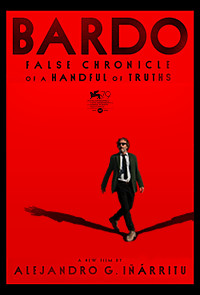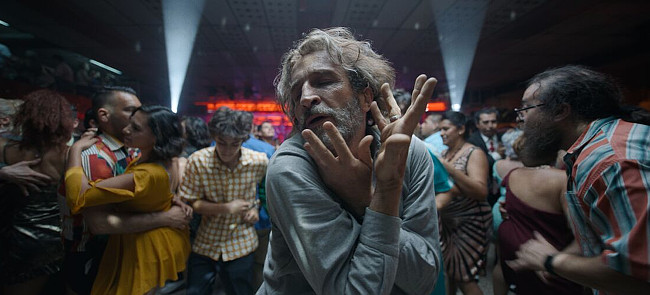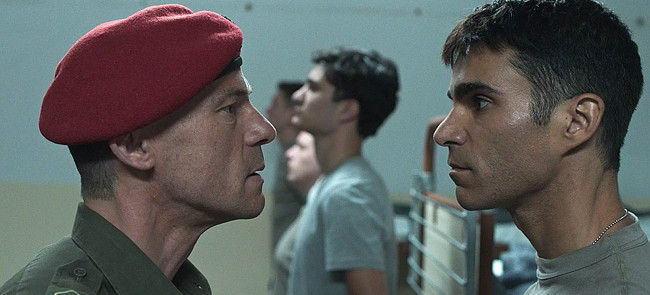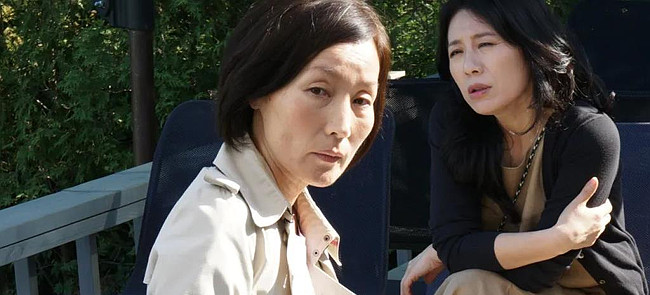| SHADOWS ON THE WALL | REVIEWS | NEWS | FESTIVAL | AWARDS | Q&A | ABOUT | TALKBACK | |||||||||||||
 Shadows off the beaten path Shadows off the beaten pathIndies, foreign, docs and shorts...
On this page:
BARDO |
EISMAYER |
IN FRONT OF YOUR FACE
| |||||||||||||
| See also: SHADOWS FILM FESTIVAL | Last update 21.Sep.22 | |||||||||||||
|
Bardo: False Chronicle of a Handful of Truths Falsa Crónica de Unas Cuantas Verdades Review by Rich Cline | 
| |||||||||||||
 dir Alejandro G Inarritu scr Nicolas Giacobone, Alejandro G Inarritu prd Alejandro G. Inarritu, Stacy Perskie with Daniel Gimenez Cacho, Griselda Siciliani, Ximena Lamadrid, Iker Sanchez Solano, Andres Almeida, Francisco Rubio, Fabiola Guajardo, Jay O Sanders, Camila Flamenco, Hugo Albores, Ruben Zamora, Jorge Gidi release Mex 27.Oct.22, UK Oct.22 lff, US 4.Nov.22 22/Mexico 2h54   Is it streaming? |
 It would be hard to imagine a more indulgent, rambling, throw-everything-at-the-screen kind of movie. But Alejandro G Inarritu isn't a filmmaker you can dismiss, as each sequence is skilfully laced with moments of visual brilliance, thematic provocations and darkly emotional honesty. Channelling Fellini at his most flamboyant, Inarritu pours personal and artistic energy into this epic Mexican odyssey. Although a leaner, earthier approach would have been more effective. Twenty years ago, Mexican journalist Silvio (Cacho) moved his wife Lucia (Siciliani) and their children (Lamadrid and Solano) to Los Angeles to work as a documentary filmmaker. After soaring success, they're back in Mexico City for him to receive a prestigious award. But his mind is playing tricks on him, travelling through wildly colourful situations that blur his past and present. So as he dodges the press, fans and others, he begins to understand that his identity might centre on something beyond his career. But is it too late for him to reorient himself? That plot description only scratches the surface, as the film is a kaleidoscopic deluge of images, themes, scenarios and motifs. Re-enactons of the Mexican-American War continually invade the movie, shot in a surreal slapstick style. The point is strong, connecting Silvio's personal story to the twisted joint history of these two nations. But the approach feels distracting, especially since there's also a very personal journey going on somewhere in here. Cacho finds ways to ground Silvio even in the more florid scenes. This helps us see what kind of man he is, complex and a bit messy, although he's also perhaps too resolutely wonderful as well. The actors around him are more naturalistic, which helps make them engaging and individualistic, although none are allowed to fully reveal themselves to the audience. Still, several knowing relational details emerge that help put things into a semblance of context. Because the film feels like its flailing around, looking for meaning pretty much everywhere, it's easy to miss Inarritu's staggeringly well-staged set-pieces. Indeed, there are several exhilarating sequences, plus a textured exploration of personal identity that touches powerfully on ideas of nationality and the fallout of history. But the film is too restless to let a point settle. And as it heads into a series of stretched-out climactic scenes, all we're thinking about is whether the movie is ever going to end.
| ||||||||||||
|
Eismayer Review by Rich Cline | 
| |||||||||||||
 dir-scr David Wagner prd Arash T Riahi, Sabine Gruber with Gerhard Liebmann, Luka Dimic, Julia Koschitz, Anton Noori, Christopher Scharf, Karl Fischer, Lion Tatzber, Lukas Johne, Mona Kospach, Matthias Hack, Harry Lampl, Matthias Bohm release WP Sep.22 vff 22/Austria 1h27  Is it streaming? |
 Based on true events, this Austrian drama traces an unexpected relationship in a military boot camp. Filmmaker David Wagner traces the narrative with remarkable focus, avoiding distracting subplots. It may seem simplistic, but it's fascinating to see a gay romance in a place where men must be tough, without emotions or weaknesses. So when power and bravado begin to shift, this becomes an inspiring exploration of honesty, resilience and tenacity. Feared by recruits, drillmaster Charles Eismayer (Liebmann) is relentlessly tough and merciless in his punishments. He greets the new volunteer intake with an icy stare and harsh demands. And Mario (Dimic) is singled out with particular disdain because he's older, of Bosnian heritage and openly gay. He's also a quick learner. Meanwhile, Charles has a happy but strained home-life with wife Christina (Koschitz) and young son Dominik (Tatzber). But he finds it increasingly impossible to suppress his sexuality, and Christina knows this. Then as Mario earns Charles' respect, their feelings begin to be mutual. Charles' boss (Scharf) reminds him that this isn't the 1980s or '90s, and hard-nosed soldiers like him make young men reluctant to sign up for military service. Indeed, even his fellow officers are annoyed by him, seeing him as homophobic and intolerant. The script and direction sometimes hedge around revealing deeper truths in the characters, almost as if Wagner is as reluctant to confront Charles' sexuality as he is. This leads to depictions of sex that feel strangely compromised, even as the offhanded storytelling is refreshing. While it's not exactly a meet cute, the first encounter between Charles and Mario is played with terrific textures by Liebmann and Dimic. And each actor adds further layers as the story progresses. Liebmann subtly reveals terrific undercurrents in Charles' brutally demanding drills. And Dimic gives Mario unusually observant eyes, more aware of what's going on than anyone realises. When these two macho men finally get together, they seem genuinely surprised to realise that this is actually a romance. While the lovely narrative ripples with underlying themes, the approach is so pared down that there's little left to think about. There are a couple of glimpses of the predatory behaviour that results from Charles' lifelong repression, but the script carries on without confronting that. That said, When Charles finally speaks openly to Christina, the conversation is earthy and truthful, leading to final act that's sweet and a little corny. So the film finds strong resonance in the way the world has changed, at least in this place.
| ||||||||||||
|
In Front of Your Face Review by Rich Cline | 
CANNES FILM FEST Is it streaming?
|  Korean filmmaker Hong Sangsoo creates a delicate atmosphere with this softly moving drama about two sisters. It's a fascinating exploration of how we both share and conceal things from each other, and Hong cleverly resists giving the viewer any more information than the quietly conflicted characters have themselves. So the film feels like a series of understated discoveries that reflect a side of humanity that's rarely put on-screen. Determined to live in the present, former actress Sangok (Lee) has returned to Seoul from the US and is staying with her sister Jeongok (Cho). As they catch up, Sangok talks about difficult jobs she held, moving from city to city, and they walk around town, visiting people and places that hold a variety of meanings. Later in the afternoon, Sangok stops by their childhood home then meets up with an admiring filmmaker (Kwon) about possibly reviving her acting career. But Sangok knows that this is unlikely, and that reconnecting with Jeongok is more important. Using gentle, extended takes, Hong observes subtle actions and what feel like everyday conversations as these siblings talk about their lives and discuss their dreams. Amid an amusing stream of awkward interaction and shared jokes, Sangok and Jeongok gradually offer more personal details that create a remarkably complex portrait of their lives, both individually and together. This may feel like a movie in which nothing much happens, but inside these women the whole world is shifting. Performances are so earthy and naturalistic that they feel improvised, especially as conversations are shot in long takes that include tentative pauses. Lee and Cho hint at things these women avoid speaking about in the way they change subjects or let their voices trail off. Lee has such an offhanded approach that it's easy to see that she has a big secret, which she finally reveals almost as if she's kidding around. And Cho skilfully whispers Jeongok's frustration at feeling left out of Sangok's seemingly glamorous life. Hong's approach is so subtle that it will resonate with each viewer in a specific way. The only even slightly obvious element is a stain on Sangok's blouse that becomes a visual representation of other things she's trying to hide. At its core, this is her personal quest for redemption, which can only come with an open heart. And it's easy to identify with how she's trying to eliminate the uncertainty that has surrounded her for too long. "As long as I can see what's in front of my face," Sangok says, "everything is fine. It's grace."
| 
See also: SHADOWS FILM FESTIVAL © 2022 by Rich Cline, Shadows
on the Wall
HOME | REVIEWS | NEWS | FESTIVAL | AWARDS
| Q&A | ABOUT | TALKBACK | | ||||||||||


